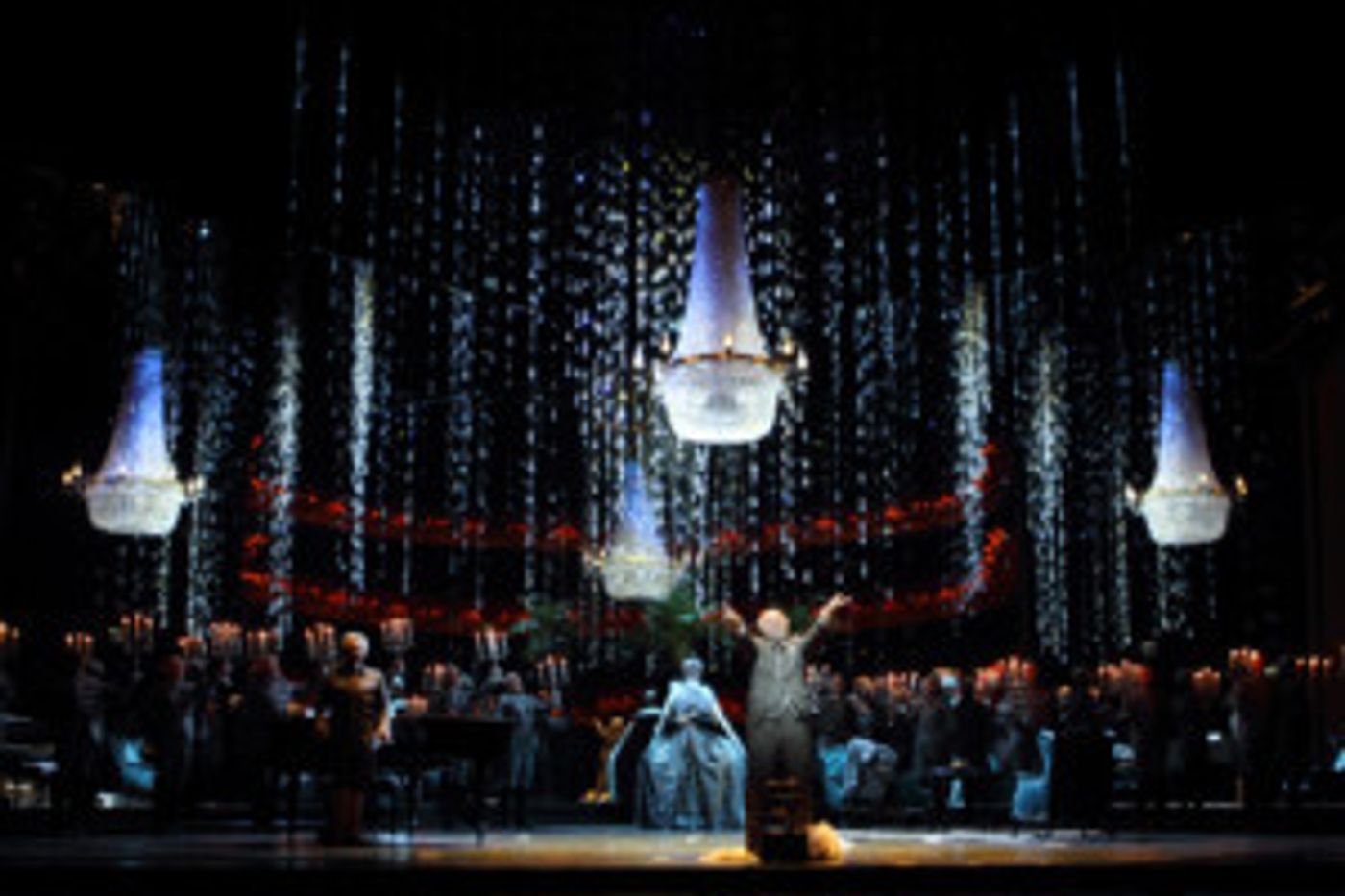Review: THE QUEEN OF SPADES, Royal Opera House

![]()
In an age where sometimes it appears that creativity's been annexed by the sleepless buzzing minds of Silicon Valley, art's need to hoard fatiguing clichés has apparently become as widespread as the old pastime of stamp-collecting.
Somehow a new production of Tchaikovsky's Queen of Spades at the Royal Opera House succeeds in piling them in one precarious tall heap. In his smorgasbord of thoroughly exhausted scenic tropes, Stefan Herheim enlists baritone Vladimir Stoyanov - here performing the supporting role of Yeletsky - to likewise play the fabricated onstage character of the long-suffering composer.
Striving to unearth biographical discoveries in fiction is a scarcely novel exercise, and here results in constant exposition of Tchaikovsky's inner struggles. The fiction he's grappling with is inspired by the great novella Pikovaya Dama by poet Alexander Pushkin; a man debatably more famous in his native land than Shakespeare in the English-speaking countries.
Together with a title card that offers a brief outline of Tchaikovsky's plight, the composer's looming onstage presence conjectures that the opera is an incidental by-product of solely his anguish - an obscure diary entry as opposed to the sublime fruit of rich labour.
Yet this would be a minor flaw if chaos did not make the spectacle's main theme completely self-defeating. Amidst such visual disarray, a concept - good or bad - is doomed to flee beyond all hope of rescue.
Herheim uses infusions of fog to achieve eeriness, reminding spectators of old-style horror movie effects. The back of the stage rises to become a mirror of the audience, society forced to witness itself - a common trope used in productions like Mario Martone's 2005 ROH take on Verdi's Un ballo in maschera. In an especially charged moment, a blustery tempest forces the double doors across the hall to burst open abruptly.
The Phantom of the Opera's swinging chandelier makes an appearance - only this time it disperses fog in a symbolic imitation of a swaying incense censer. What does Tchaikovsky look at that reflects his own repression? A caged bird.
Modernist, symbolic productions of Russian operas have in the past been staged with accurate proportions of both taste and size; Temur Chkheidze's 1997 Constructivist Mariinsky production of Prokofiev's The Gambler, later revived at the Metropolitan Opera, comes to mind. This interpretation on the other hand becomes a nervous scramble hell-bent on accumulating every single overused and inane literary metaphor and cinematic reference.
Perhaps because of its incessant physical shenanigans and vapid choreography, most of the cast falters. Assuming the lead in an opera which hinges on Gherman, Aleksandrs Antonenko yells through the role, spouting bellows off-key in an entirely amusical manner.
Occasionally singers force their instruments so violently when they are ill-disposed or recovering from a laryngeal condition. However, no announcement was made on Antonenko's behalf; the reason for his vocal plight remains unknown. The famous aria "Chto nasha zhisn', igra!" ("What is our life? A game!") had Antonenko turning the single note of "zhisn'" into an off-pitch, ascending chromatic scale.
Eva-Maria Westbroek's Liza is similarly compelled to shout and occasionally squawk through her lines, though overall her execution more closely conforms to the music. Proportioning some of her phrases with abrupt, ill-thought rhythms, she lends too much melodrama to the subtler passages and sacrifices vocal cleanliness. The introduction of her first aria, "Otkuda eti slozi?" ( "Where do these tears come from?") is rushed, its high notes perilously strained.
In some instances her diction is incorrigibly muffled; in others, she rapidly inserts a sneaky breath to reach completion of her line. Similarly to her colleague Antonenko, Westbroek tries too hard.
Burdened with his dual role of Yeletsky and Tchaikovsky, Vladimir Stoyanov struggles - with no change of costume or setting - to unjustly have to play two characters, switching from singer to actor and back again. Despite performing smoother vocal lines than many of his cast, he too succumbs to shaky notes that threaten to subside too early.
Understandably left baffled by the needless double task that he assumes, by the time Yeletsky sings of love for Liza - "Ja vas lyublu, lyublu bezmerno" ("I love you, love you immeasurably") - the expression on his face is stoic and completely lost, keeping the mask of his Tchaikovksy personage.
Most lyrical of all is mezzo-soprano Felicity Palmer, the only singer here to execute piano and diminuendi with both grace and subtle gradations of volume. Her nostalgic aria, "Je crains de lui parler la nuit", effuses both portentousness in her dark, cavernous register and the rickety frailty and intermittent breathlessness of a woman of the Countess's age. At last there surfaces a trace of sentiment in the production; something tangible rather than literal smoke and mirrors.
Urging the music to race to its climaxes, Antonio Pappano's conducting remains in the realm of his less frequent subpar performances. With persistently muffled brass and the clangour of woodwind in strife, the music is most often loud and intense without purity.
Rhythms could be much more multi-faceted; some of the quicker ones, more stayed. Even the last funereal chords elude cohesion. In a strange moment at the end of the first half, Pappano turns his back to the orchestra as though to purportedly conduct us - whether the scourge of society or the whole of humanity. The gesture is bizarre, musically hazardous and inexplicable.
With this extremely misguided attempt to explore the man behind the music, Stefan Herheim's production violates the art of the composer in an anti-lyrical and oversaturated mishmash.
The Queen of Spades runs at the Royal Opera House until 1 February.
Photo credit: Catherine Ashmore
Reader Reviews
Videos

